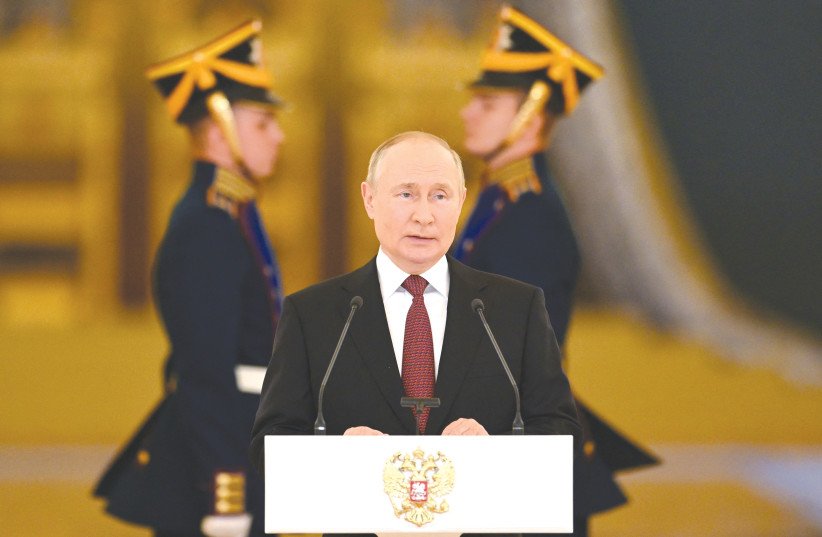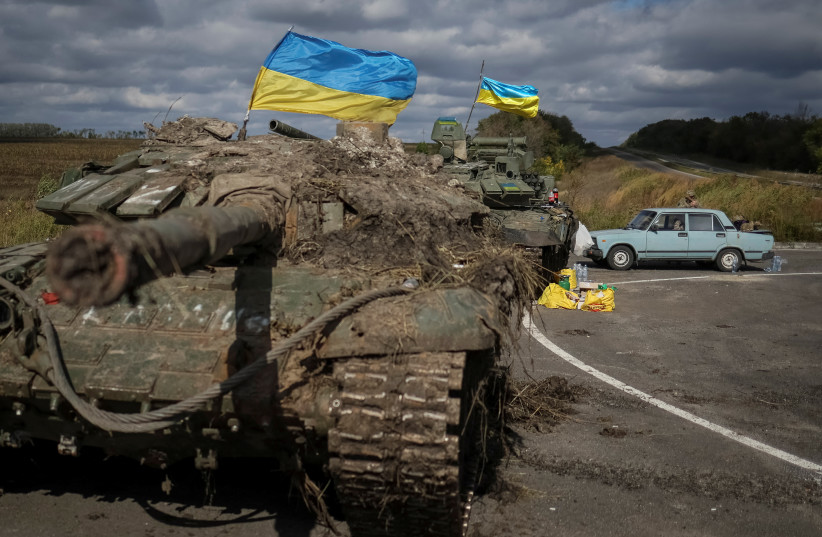ALEXEI BAYER

When Vladimir Putin decided to start rebuilding the Soviet Union by conquering Ukraine, he didn’t realize that Russia’s industrial base was too weak to support his military adventures. As his promises of international greatness clash with reality on the battlefield, he faces discontent and accusations of defeatism and, worse, treason.
One thing Russia has always been good at is amassing territory. Someone calculated that between around 1450, when the Grand Duchy of Muscovy came into its own, and the demise of the Russian Empire in 1917, it expanded at the average rate of three square kilometers per hour.
World War I brought an end to the empire. Lenin denounced Russian imperialism, declaring the principle of national self-determination. Some nations on the western edge of the empire broke loose, but the Red Army brought Ukraine, Transcaucasus and Central Asia back into the fold. The Bolsheviks married Russia’s expansionist drive to their millenarian ideology, developing a version of the land grab based on a supposedly scientific claim of the inevitable worldwide triumph of communism.
The task of spreading communism by the bayonet – and keeping it there – required a large war machine, which in turn required a powerful industrial base. Stalin’s industrialization thus gave absolution priority to military production. During the 1930s, and before Hitler’s rearmament gained momentum, the Soviet Union produced more tanks than the rest of the world combined.
The Soviet military got the best equipment and manpower, as well as advanced technology and science. Military jobs paid well and attracted the best graduates. Some 15-20% of Soviet GDP was devoted to the military-industrial complex, and the true share was probably higher since some civilian production also served the needs of the Defense Ministry and its agencies.
 A view shows captured Russian tanks with installed Ukrainian flags, as Russia's attack on Ukraine continues, near the town of Izium, recently liberated by Ukrainian Armed Forces, in Kharkiv region, Ukraine September 19, 2022. (credit: GLEB GARANICH/REUTERS)
A view shows captured Russian tanks with installed Ukrainian flags, as Russia's attack on Ukraine continues, near the town of Izium, recently liberated by Ukrainian Armed Forces, in Kharkiv region, Ukraine September 19, 2022. (credit: GLEB GARANICH/REUTERS)The Soviet Union never stopped spreading communism (and Moscow’s domination) with satellites added in Africa, Asia and Latin America. Much of that was done indirectly through military aid, but it used its own troops to invade Afghanistan in 1979. At the same time, in countries where the Soviet-style system had already been established, the Brezhnev Doctrine envisioned the use of Soviet troops to prevent regime change – as in Czechoslovakia in 1968.
Unlike the Bolsheviks, Mikhail Gorbachev promised a definitive break with Russia’s imperial ambitions. He allowed a major rollback in Eastern Europe in 1989, and then the Soviet Union too collapsed, creating 14 new nations, some of which never had independent states.
The reality of post-Soviet Russia
POST-SOVIET Russia still contains nearly 200 ethnic groups ranging from 3.7% of the population (the Tatars), to just a handful of representatives. But it now has the smallest territory in several centuries.
Gorbachev’s was a political decision; then came market reforms that made it impossible for Russia to expand its territory by military means.
During the 1990s, Russia’s economic model shifted from autarky to integration in the global economic system. As the prices of oil, natural gas and other commodities increased, boosting Russia’s export revenues, it became easier to import rather than build domestic production. Russia became a textbook example of the Dutch syndrome, when a nation exporting natural resources suffers deindustrialization.
Meanwhile, the face of industrial production in the world also changed. The technological revolution made producers dependent on hi-tech and on the US-centered hi-tech establishment. Globalization opened the borders and created an international division of labor and cross-border supply chains.
Russia’s participation in this system was limited due to pervasive corruption, government interference, an ineffective legal system, and a generally poor business climate.
Deindustrialization and corruption have long been evident in the military industrial complex as well. According to a recent investigation by Russian journalists, Leninets, an enormous St. Petersburg defense contractor specializing in radars and navigation equipment, continues to produce at one-quarter of its three dozen facilities. The rest have been rented out or converted to shopping malls and residences.
Vast sums allocated to the development of new systems are routinely stolen or misappropriated, with nothing to show for it. Small wonder: its design bureau on the shores of the Gulf of Finland has been replaced by a villa for the owner, a friend of Putin’s.
Lack of resources
PUTIN IS NO economist. When he decided to revive Russia’s expansionist dreams and recapture old Soviet lands, starting with Ukraine, he didn’t realize how few weapons Russia produced and how much it relied on imported components. Such components were cut off by sanctions; even countries that don’t support Western sanctions are apprehensive of selling to Russia for fear of incurring sanctions of their own.
But after years of relentless propaganda, Russians still see their country as a military superpower. And all of a sudden it can’t defeat Ukraine, which in their imperial arrogance they have always treated with disdain and taught to regard as a failed state. Faced with this unsettling disconnect, jingoist right-wingers, who used to applaud Putin’s invasion, have changed their tune. Surely Russia is failing because treason has reached high into the Kremlin and Putin is taking direct instructions from Biden.
Russia’s hawks claim that it is fighting with one hand tied behind its back. They want a nationwide mobilization, a set of wartime emergency decrees, and an economy on a war footing. They demand carpet bombings of Kyiv, Lviv and other cities, and annihilation of civilian infrastructure such as power plants, railway lines, bridges and dams across Ukraine. Some even call for blowing up nuclear power plants and using tactical nuclear weapons. Anything less would be cowardice or treason.
The truth is that Russia can no longer do it. It simply lacks the required resources and firepower. A major escalation of the war, and more war crimes by Russia, will only bring more weapons – and more advanced weapons – to Ukraine. Ukrainians are getting better at using them and are learning to fight a modern war. Things are going to get even worse for Putin’s soldiers, and infighting in Russian society will intensify with each new defeat.
No comments:
Post a Comment